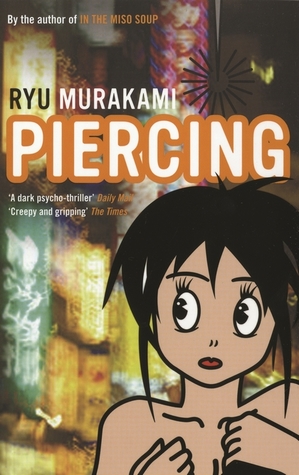Ryu Murakami is an author I’ve been aware of for a while now, partly because of his literary namesake, Haruki Murakami, and also through noting a positive response to his In The Miso Soup, translated to English in 2005, although I’d never really felt the need to read his work. Then, by chance, I discovered that a film I like, the teeth-gritting Audition (1999), was based on one of his short stories and he had, in fact, written the screenplay, too. Well what else could I do but hunt down the man’s books after all? And in doing so I choose Piercing (2007), published in Japan in 1994, on the basis that I preferred its cover over In The Miso Soup‘s.
Billed as “a dark psycho-thriller” by the Daily Mail and by the Times as “creepy and gripping”, Piercing is certainly that. Or, perhaps, was. It’s been thirteen years between the original and the translation and in that time Asian cinema has enjoyed wider popularity, especially the more violent material, and as a result, the novel’s effect is lessened as the content is what’s expected of Japanese thrillers of this ilk, and therefore it comes across as more schlock than shock. Still, if you can pleasd innocence of Japanese cinema in recent years, then the novel’s intended effect may apply.
Kawashima Masayuki lives with his wife and newborn child in their apartment, which doubles as his wife’s class for teaching bakery to locals and is therefore “permeated with the buttery smell that for Kawashima had come to symbolise happiness.” While to all extents and purposes they are a happy couple, Kawashima suffers a form of panic attack and for the last ten days, with the wife asleep, has found himself standing over his child’s cot with an ice pick, sweating:
Every time he studied this instrument, with its slender, gleaming steel rod that tapered down to such needle-like sharpness, he wondered why it was necessary to have things like this in the world. If it were truly only for chopping ice, you’d think a completely different design might do. The people who produce and sell things like this don’t understand, he thought. They don’t realise that some of us break out in a cold sweat at just a glimpse of that shiny, pointed tip.
It’s an implausible scene, the type you’d expect in movies, and there’s a knowing reference thrown in to Basic Instinct, to show that Murakami knows exactly how implausible it is. But he doesn’t care, this is a thriller after all, and so Kawashima’s panic attacks inspire real fear for himself and of what he is capable:
You wouldn’t do something like that, you would never stab the baby, he told himself hundreds of times, but the voice inside him never stopped replying: I just might.
The fear that he may harm his own child leads Kawashima along a dangerous road as, like the major players in this Piercing, he has a past, and the only way to protect his child is to take himself off elsewhere and what begins as a sadistic urge soons becomes a feat of meticulous planning, horrifically mixing the inhuman with the mundanity of everyday living:
There was no way to be one hundred per cent sure of not getting caught – this had been his first thought on waking – but merely wounding some woman was out of the question. If she lived, she’d surely go to the police, and that would be it for him. He’d mulled over such problems while brushing his teeth and washing his face.
The story builds from there, chapter by short chapter, and then, when all hell breaks loose, Piercing opens up into a non-stop catalogue of cat-and-mouse drugs and violence that, in a single chapter consuming half the novel, leads to a conclusion that’s hard to accept, yet strangely fitting.
The piercing of the title, while it could relate to puncturing someone with an ice pick, relates to the thoughts of Kawashima’s eventual target, a young woman who has pierced her own nipple, but these reflect the novel’s wider concerns:
To be able to choose your own pain – it’s a little scary, she thought, but it’s wonderful, too.
Murakami’s delivery is deadpan throughout, never passing judgement on the events in his novel, regardless of how wrong or stupid they seem, as if to say, this is the story, accept it. Sadly, it’s too pulpy to stir a sense of wrong or right in aligning with characters, but the weaving in and out of their perspectives is done well, increasing the dramatic irony with each incident, and is what makes Piercing particularly gripping and worth having a stab at.

I read In the Miso Soup and loved it, but have never even heard of this. It sounds goryingly brilliant, though.
Amazon has it listed as coming out in a few days time. The shop I bought it in must have been displaying it a week or so early. Naughty!
I’ve got a copy of ‘In the Miso Soup’ on my shelf. I’m interested in Japanese authors, both older and newer ones. I’ll have to bump this Murakami up the pile to read it while your review is fresh.
I really enjoyed In The Miso Soup, but I can’t decide whether to read Piercing or not. I don’t know if the subject matter doesn’t just freak me out a wee bit.